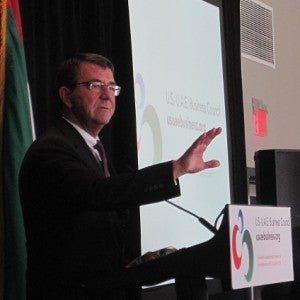Washington, D.C. — The United States Deputy Secretary of Defense, Dr. Ashton Carter, was honored during a luncheon hosted by the U.S.-U.A.E. Business Council in Washington, D.C. on Thursday afternoon. The exclusive event, held at the W Hotel, attracted senior executives and government officials from the U.S. and United Arab Emirates (U.A.E.) and featured keynote remarks by Deputy Secretary Carter emphasizing the U.S. Administration’s commitment to strengthening ties with partners in the Middle East North Africa (MENA) region, particularly the U.A.E.
“Regardless of the strategic choices we will have to make, one decision that’s off the table is the United States’ enduring commitment to the Middle East, and to the U.A.E. specifically,” said Dr. Carter.

U.S. Deputy Secretary of Defense Dr. Ashton Carter discussed U.S. policy towards the U.A.E., and the broader Middle East, with business and government leaders in D.C.
Deputy Secretary Carter’s speech followed an introduction and welcome remarks from Danny Sebright, President of the U.S.-U.A.E. Business Council, which underscored the importance and depth of the U.S.-U.A.E. defense and security relationship.
In his off-the-record comments, Carter pointed to the long history of defense, security, and humanitarian partnership between the U.S. and U.A.E. within the broader context of maintaining peace and stability in the Middle East North Africa (MENA) region and around the world. In doing so, Carter explained that the growing commercial and trade relationship often complements defense and security policy in the region. Carter then clarified that the trade relationship strengthens regional security efforts through partnership and encouraged the audience to explore additional paths of collaboration.
Prior to Carter’s keynote address, Sebright laid the foundation for the event’s discussion, explaining how the commercial defense and security sector continues to support the growing U.S.-U.A.E. trade relationship. In his remarks, Sebright applauded Secretary Carter for his leadership role in the Obama Administration’s efforts to cultivate more opportunities for public and private commercial partnership. In doing so, Sebright also laid out a number of possible “next steps” for consideration in 2014 aimed at advancing the defense and security relationship between the two countries. He challenged DoD to think about joint investment in R&D with the U.A.E., a new Mil to Mil dialogue, an enhanced Status of Forces Agreement between the two countries, and new technology and equipment release to the U.A.E. like the Joint Strike Fighter.
During his comments, Sebright pointed to the defense community’s growing footprint in other economic sectors, especially in the U.A.E., and significant support of American and Emirati job creation and training. In drawing from his own decades of experience working for the U.S. Department of Defense and advising companies on conducting business in the region, Sebright briefly profiled several high growth sectors for private and public sector stakeholders.
“The U.A.E. is a key strategic partner for the U.S. supported by a growing commercial defense and security sector, and has been for decades,” said Sebright. “Couple that with a rapidly growing trade and economic relationship expected to exceed last year’s record numbers and it is clear to see why the Administration, and Deputy Secretary Carter specifically, remains committed to partnerships with the U.A.E., and the broader MENA region.”
Following the formal program, the floor was opened to the audience for a brief question and answer session with Secretary Carter. During the exchange, representatives from business, government, and the broader U.S.-U.A.E. community were afforded the opportunity to discuss matters central to their work and hear Deputy Secretary Carter’s perspective on many of their issues first-hand.
Sebright concluded the luncheon with a message of gratitude to Carter for his insights and to the audience for their substantive engagement.
